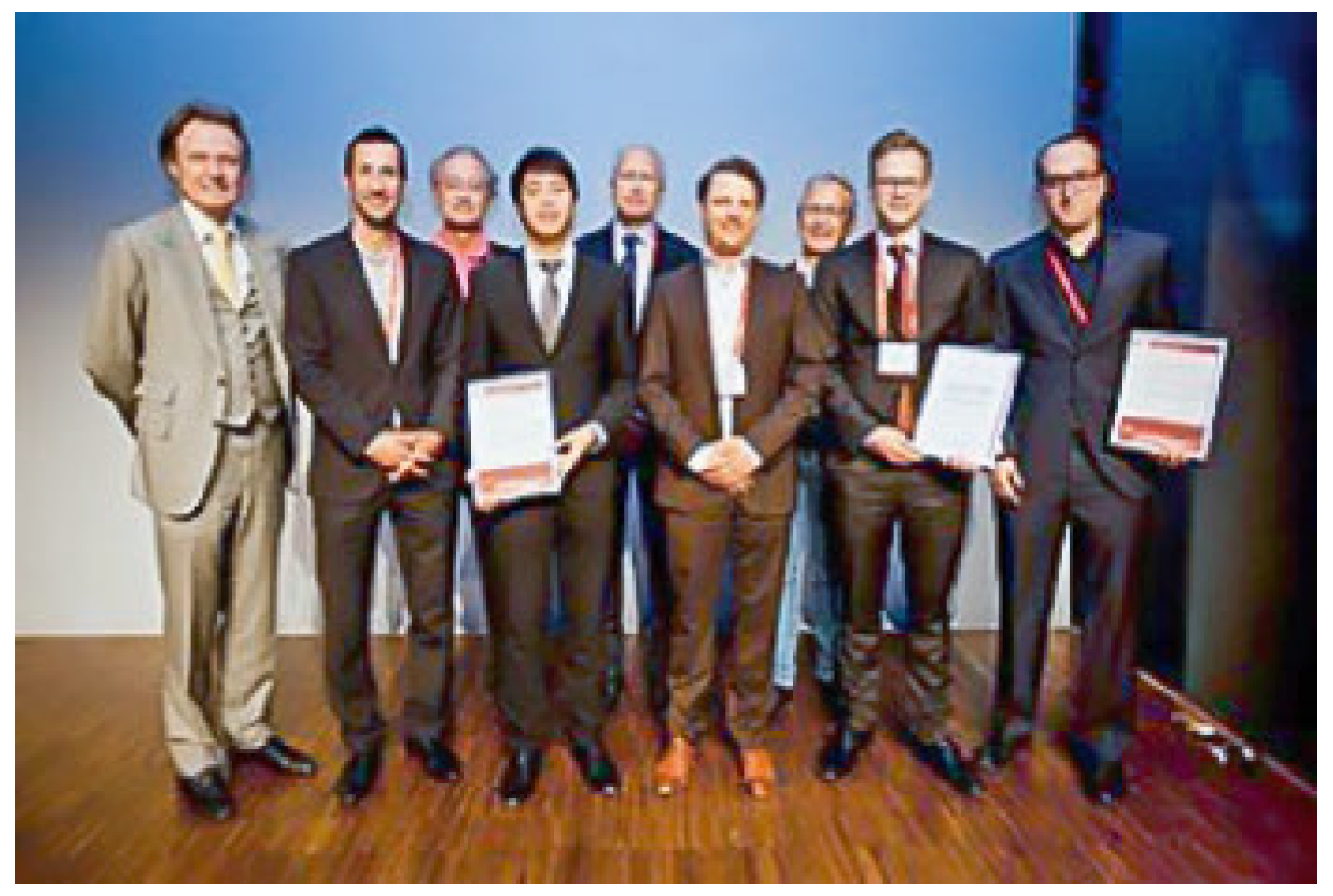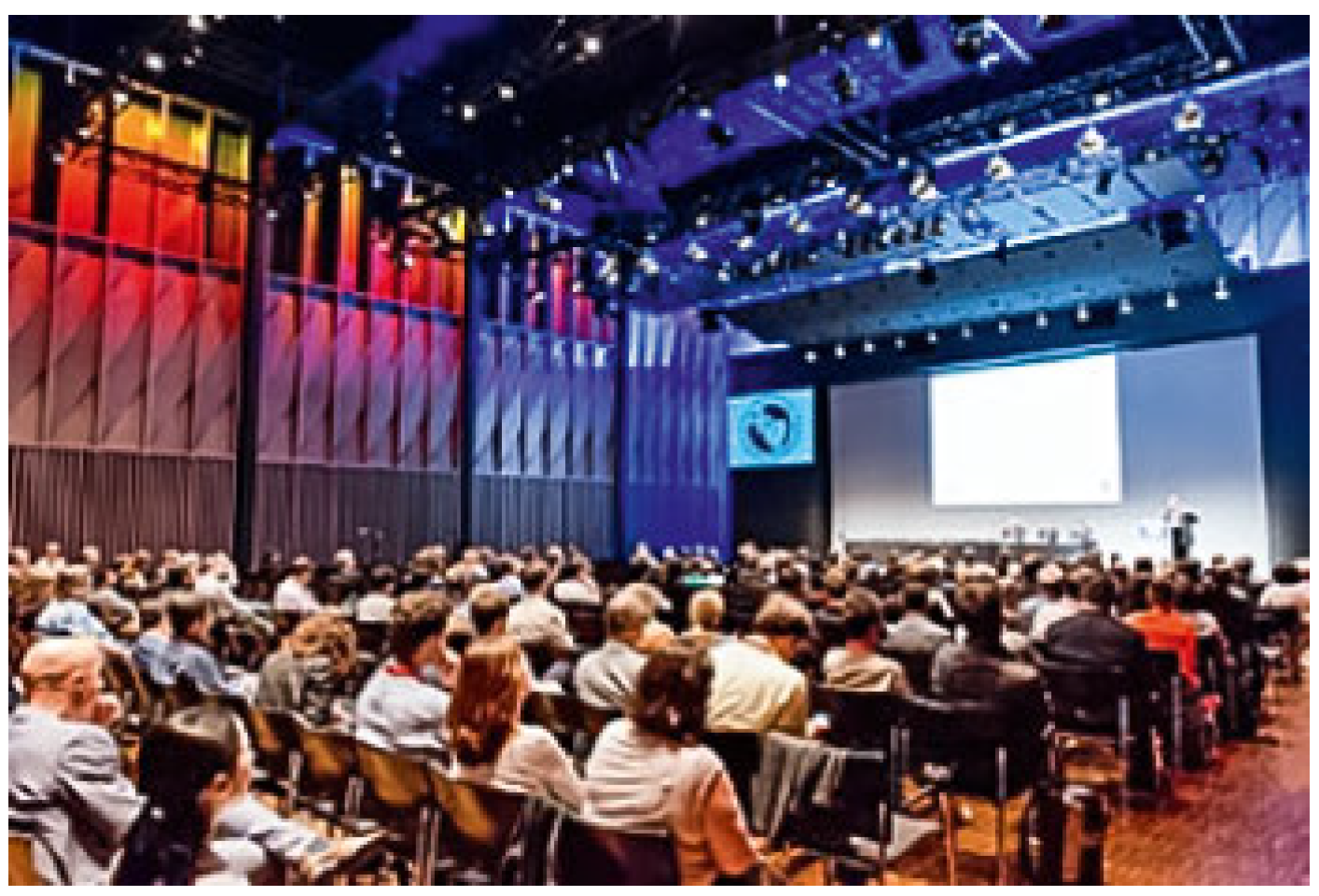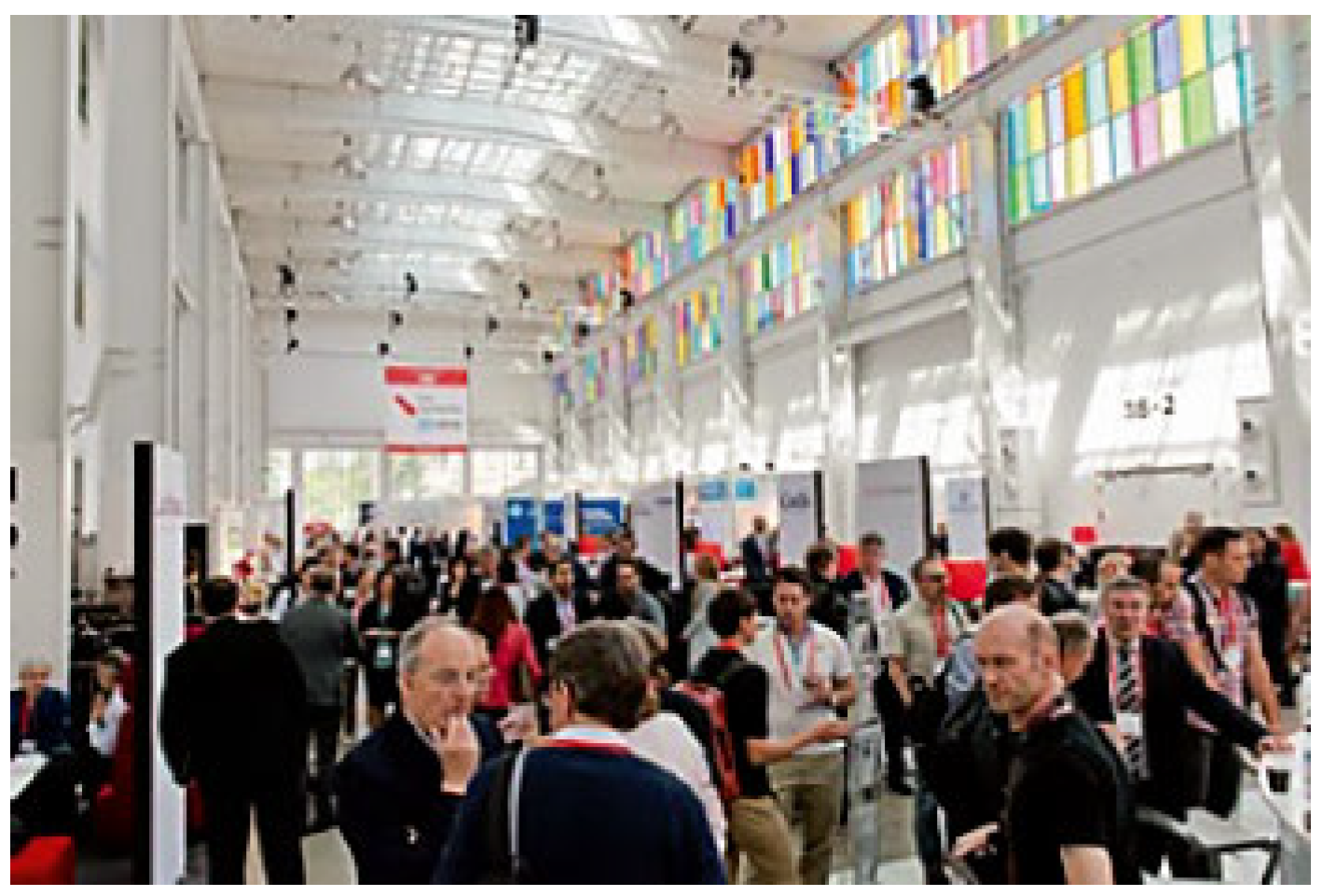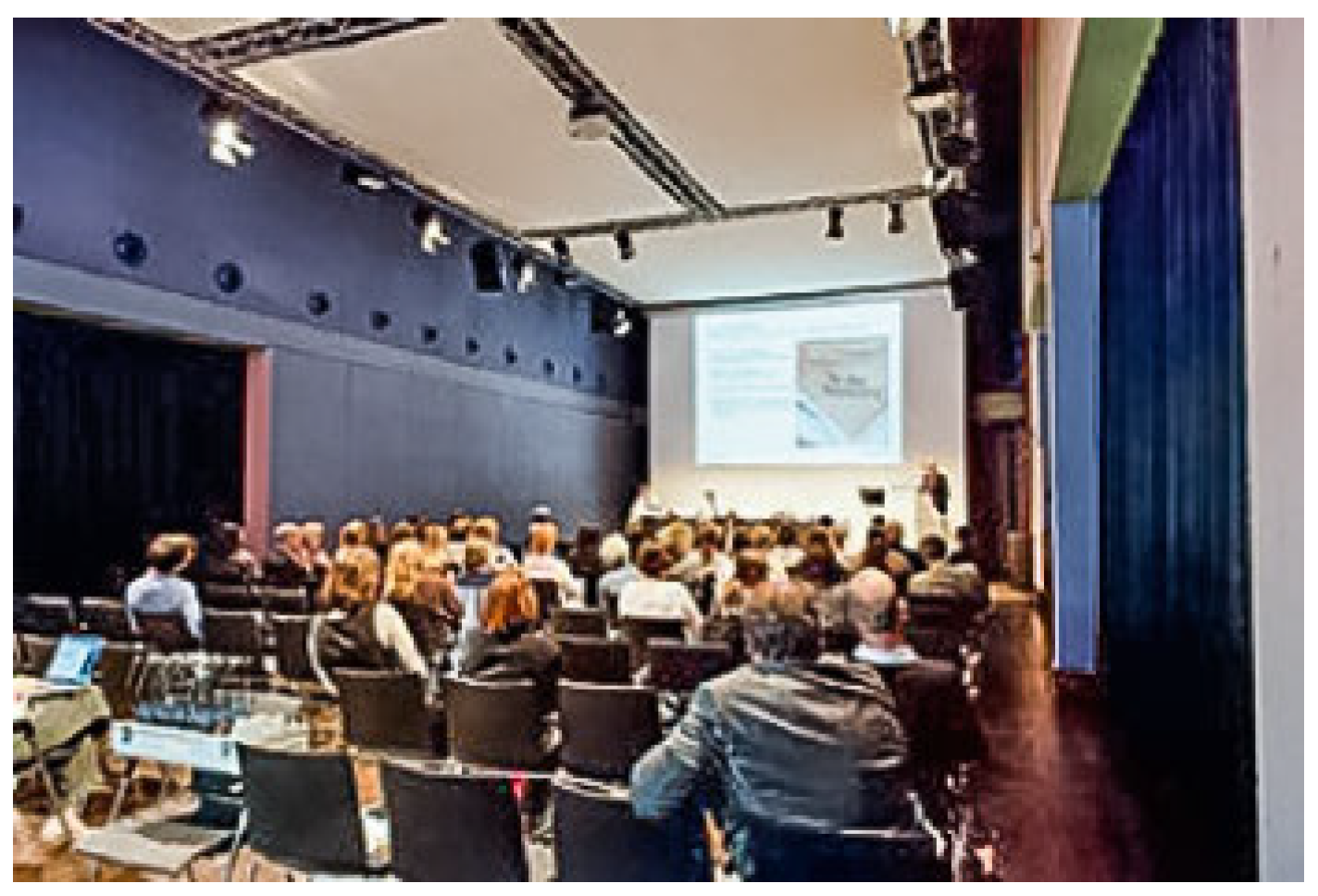Last June the Swiss Society of Cardiology met for the first time, in the Trafo Center in Baden (
Figure 1), for their Annual Scientific Meeting together with the Swiss Society for Cardio-Thoracic Surgery. The congress was extremely well received and attended by 974 participants from all over Switzerland, with a few participants from abroad (
Figure 2). In addition, 347 exhibitors took part in the congress.
The scientific programme covered the entire field of cardiovascular medicine from blood pressure to anticoagulation, from coronary artery disease to heart failure and transplantation, and from prevention to acute coronary syndromes. As the Swiss Society for Emergency and Rescue Medicine was the special guest, there was a focus on cardiac emergencies. The faculty included participants from all major hospitals in Switzerland and a few foreign speakers; overall 238 speakers and 172 chairpersons contributed to the programme. This year 248 abstracts were submitted and 177 were presented in oral or in poster sessions.
As always, the Andreas Grüntzig Award was a highlight of the programme, with a lecture of this year’s awardee Peter Buser from Basel who talked about “From functional to molecular analysis of heart disease. Steps into the future of cardiac imaging.” The Senning Lecture was given by Ulrich Althaus, former Director of Cardiovascular Surgery at the Inselspital in Bern on “Das Herz der Maler und Dichter.”
A particular focus was on younger colleagues as chairpersons and speakers. Indeed, the Swiss Cardiologists of Tomorrow contributed to the programme and held their own party on Wednesday night. The official get-together of the Congress was held in the Wettingen monastery on Thursday night. The congress was organised by the Congress President Prof. François Mach from the Hôpital Universitaire de Genève, together with a team of Board Members of the Swiss Society of Cardiology. On Wednesday evening, the Annual Assembly of the Swiss Society of Cardiology took place under the chairmanship of the current President of the Swiss Society of Cardiology Prof. Michel Zellweger from the University Hospital Basel (
Figure 3). Major topics were the current and future reimbursement policy of the Swiss government under the leadership of the current Health Minister Alain Berset. It became clear – as outlined by the representatives of the Swiss Society of Cardiology for these issues, Urs Kaufmann from Bern and Giovanni Pedrazzini from Lugano – that most reimbursements, particularly for interventions, but also for diagnostic procedures. will decrease by on average between 5 to 10% in 2018 (range –1 to –28% in the overall reimbursement), which will certainly affect the Swiss cardiologist community as a whole, regardless of whether they work in private practice or hospitals.
A large number of new members and junior members have been welcomed to the Society, showing that the Swiss Society of Cardiology is well and alive. At the end of the General Assembly a controversial topic was discussed: the creation of subspecialty certifications, for example, in interventional cardiology and interventional electrophysiology. Some participants argued in favour of such a strategy, which would be in line with developments in Europe and North America, whereas some, particularly practicing cardiologists, raised concerns about such a step.
On Friday morning, 9 June 2017, the traditional Young Swiss Investigators Session took place under the chairmanship of Prof. Thomas F. Lüscher from the University Hospital Zurich and Prof. François Mach from the Hôpital Universitaire de Genève (
Figure 4). Five awardees presented their excellent work. Indeed, all participants and the chairmen, as well as Prof. Augusto Gallino, board member of the Swiss Heart Foundation and Prof. Hans Rickli from the Swiss Society of Cardiology, were impressed by the quality of the research presented. David Nanchen from the
Centre Hospitalier Universitaire Vaudois received the
Swiss Heart Foundation Research Award for his work on familial hypercholesterolaemia in patients with acute coronary syndromes, an analysis of the Swiss SPUM ACS cohort of the University Hospitals Berne, Geneva, Lausanne and Zurich supported by the Swiss National Research Foundation. The neurologist and stroke physician David Seiffge from the University Hospitals Basel shared this prize with him for his work on thrombolysis in patients on anticoagulants, in particular novel oral anticoagulants. The Swiss AMGEN Cardiology Award of the Swiss Society of Cardiology, a prize that has changed its name over the years, but has been in place now for more than two decades, went to the cardiologist Christoph Gräni for his work at the University Hospital Zurich in nuclear cardiology, under the leadership of Prof. Philipp A. Kaufmann, on anomalous coronary arteries, work reported in three papers published in the
European Heart Journal, the
Journal of Nuclear Cardiology and the
Swiss Medical Weekly. Finally, two awardees of the Otto Hess Trainee Award presented their work: Panagiotis Antiochos, MD, from the Centre Hospitalier Universitaire Vaudois in Lausanne, “Association between anti-apolipoprotein A-1 antibodies and cardiovascular disease in the general population – results from the CoLaus study;” and Nicolas Johner, MD, from the Hôpital Universitaire de Genève, “Electrophysiologic properties in the coronary sinus of sustained versus non-sustained atrial fibrillation: a retrospective study and prediction model.”
Figure 4.
The awardees of this years SSC Annual meeting with the chairpersons oft he session (from left to right): Prof. Thomas F. Lüscher, David Nanchen (Research Prize of the Swiss Heart Foundation), Augusto Gallino, Nicolas Johner (Otto Hess Trainee Award), François Mach, David Seiffige (Research Prize of the Swiss Heart Foundation)Hans Rickli, Christoph Gräni (Swiss Amgen Cardiology Award) and Panagiotis Antiochos (Otto Hess Trainee Award).
Figure 4.
The awardees of this years SSC Annual meeting with the chairpersons oft he session (from left to right): Prof. Thomas F. Lüscher, David Nanchen (Research Prize of the Swiss Heart Foundation), Augusto Gallino, Nicolas Johner (Otto Hess Trainee Award), François Mach, David Seiffige (Research Prize of the Swiss Heart Foundation)Hans Rickli, Christoph Gräni (Swiss Amgen Cardiology Award) and Panagiotis Antiochos (Otto Hess Trainee Award).
| Prize Winners Joint Congress SSC/SSCS 2018, Baden | |
| Abstract Prizes | | |
Topic Abstract Topic
Nr. | Abstract Title | Winner |
| 1 | Cardiovascular biology (Including all abstracts with in vitro or in vivo investigations) | Sirtuin 5 mediates brain damage and neurological deficits in the mouse model of cerebal ischemia – reperfusion injury | Ms. Candela Diaz Canestro, Zurich |
| 2 | Pacemaker, defibrillator and electrophysiology | Association between genotype and ventricular involvement patterns in arrhythmogenic right ventricular cardiomyopathy/dysplasia | Ms. Deniz Akdis, Zurich |
| 3 | Cardiac failure, valvulopathies, cardiomyopathies, pericardiopathies, heart transplantation | Severe retinal endothelial dysfunction in patients with ischemic cardiomyopathy | Mr Jens Barthelmes, Zurich |
| 4 | Acute coronary syndrome (ACS), percutaneous coronary intervention (PCI), coronary artery bypass graft surgery (CABG) | Effect of pre-test probability on diagnostic and prognostic performance of high-sensitivity cardiac troponin for acute myocardial infarction | Mr Patrick Badertscher, Basel |
| 5 | Epidemiology, risk factors, rehabilitation, thromboembolic disease | Whole Blood Omega-3 Fatty Acid Concentrations Are Associated with Lower Blood Pressure in Young Healthy Adults | Mr Mark Georg Filipovic, Baden |
| 6 | Cardiac imaging, congenital and paediatric cardiology | Echocardiographic predictors of midterm outcome after MitraClip implantation | Mr Ioannis Kapos, Zurich |
| 7 | Clinical cases | Leaflet thrombosis following transcatheter mitral valve replacement | Mr Florian Franzeck, St Gallen |
| | Best abstract “Congenital” | Left heart failure after double switch operation: The dilemma of preventing systemic right heart failure in congenitally corrected trasnposition of the great arteries | Ms Francesca Bonassin Tempesta, Zurich |
| Research Prizes and Honorary Lectures | |
| Prize | Title | Winner |
| Andrea Grüntzig Award | From functional to molecular analysis of heart disease. Steps into the future of cardiac imaging. | Mr Peter Buser, Basel |
| Senning Lecture | Das Herz der Maler und Dichter | Mr Ulrich Althaus, Bern |
| Amgen Swiss Cardiology Research Award | Noninvasive evaluation, prevalence and outcome of middle-aged individuals with anomalous origin of the coronary artery from the opposite sinus | Mr Christoph Gräni, Zurich |
| Medtronic Young Investigators Award | Improving skeletonised internal thoracic artery harvesting: A low thermal electrosurgical knife provides endothelial integrity and avoids vessel wall injury | Ms. Alicja Zientara, Zurich |
| Research Prize Swiss Heart Foundation | Prognosis of patients with familial hypercholesterolemia | Mr David Nanchen, Lausanne |
| Research Prize Swiss Heart Foundation | Recanalization therapies in acute ischemic stroke patients | Mr David Julian Seiffge, Basel |
| Otto Hess Trainee Award | Electrophysiologic properties in the coronary sinus of sustained versus nonsustained atrial fibrillation: a retrospective study and prediction model | Mr Nicolas Johner, Geneva |
| Otto Hess Trainee Award | Apolipoprotein A-1 autoantibodies as a risk factor for coronary artery disease and all-cause mortality in the general population | Mr Panagiotis Antiochos, Lausanne |






